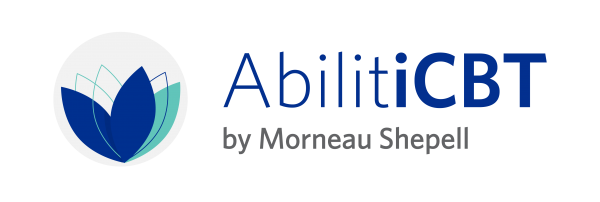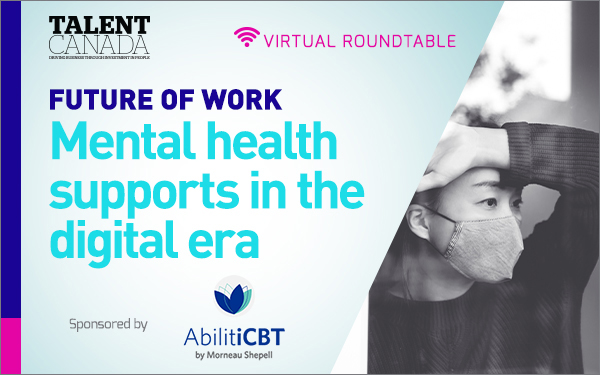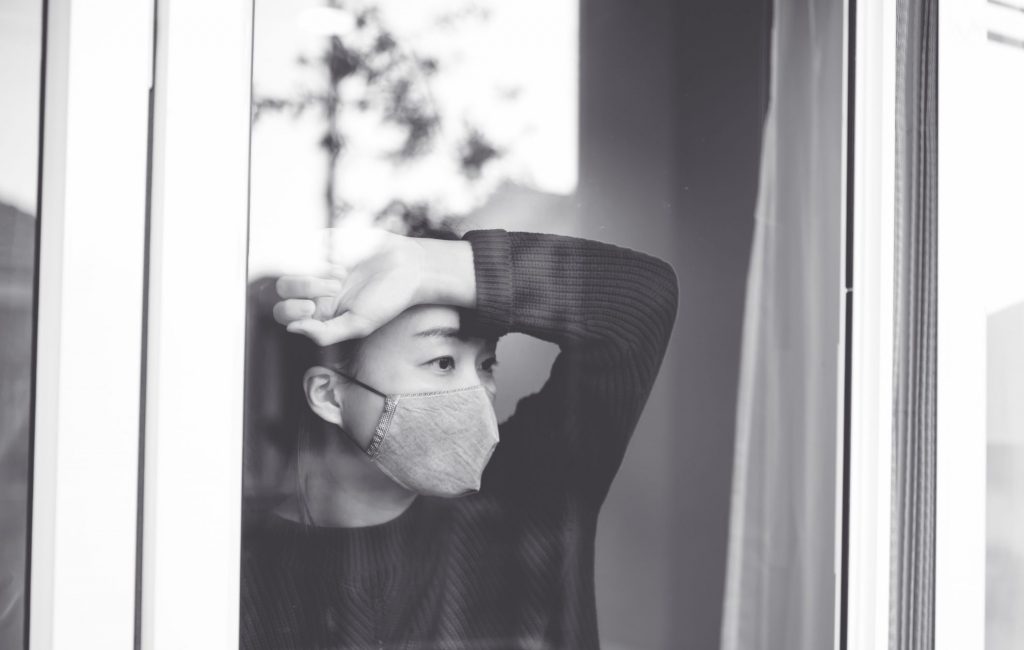

Features
Accommodation/Return-to-work
Features
Mental Health
PSWA
As pandemic lengthens, spotlight turns to mental health
Sponsored

 Future of Work: Mental health supports in a digital era event was held on Jan. 22.
Future of Work: Mental health supports in a digital era event was held on Jan. 22. The far-reaching effects of the COVID-19 pandemic have found an unfortunate resting place — our minds.
Since March of 2020, the world of work has been flipped upside down and citizens across Canada and the rest of the world are facing unique and difficult social situations.
Now in the middle of winter, isolation, depression and burnout issues are front and centre.
“What’s really happened through COVID-19 and 2020 is that the number of stressors we’re being faced with has exponentially increased,” said Nigel Branker, president, health and productivity solutions and executive vice-president at Morneau Shepell in Toronto.
Working from home, assisting school-aged children with online learning or worrying about family members in long-term-care facilities have all played a factor in reduced levels of mental health and well-being, he said.

The COVID-19 pandemic has brought a variety of mental health issues to the forefront for employees. (MIA Studio/Adobe Stock)
Essentially, people are being bombarded from all sides, said Branker, noting that the sheer magnitude of stress has resulted in a “small silver lining” of reduction in stigma around mental health.
On Jan. 22, Talent Canada hosted a live virtual event in partnership with AbilitiCBT by Morneau Shepell — Future of Work: Mental health supports in a digital era.
The event consisted of two expert roundtables exploring strategies and solutions for the workplace, with panelists discussing how business leaders can take advantage of digital opportunities to assist their staff through this unique time.
Watch our virtual event
Mental health has become the focal issue as Canada nears the one-year mark on COVID-19-related lockdowns and social restrictions, said Paula Allen, senior vice-president and global leader of research and total well-being at Morneau Shepell.
“Very soon after the pandemic began, we realized this wasn’t just about washing hands, wearing a mask and physical distancing,” she said. “This really was about making sure that your people were well supported… Because if you don’t do that, there is no business continuity plan.”
Morneau Shepell’s Mental Health Index™ (MHI) has been tracking the changes in this space among the working population, even before COVID-19 reached Canadian soil. According to the index, mental health issues have continued to erode across the nation throughout the pandemic.
Optimism has declined and feelings of isolation have risen, noted Allen. “This is impacting us in a deep way.”
Changing mental health landscape
As the COVID-19 pandemic continues, mental health is becoming a “really important business issue,” said Branker. Unfortunately, many are not coping well, and that should be cause for concern among employers.
If the MHI data has revealed anything, it’s that the situation is really serious, he said.
“Not to be alarmist, but what the data reveals is… the magnitude of how much people are struggling.”
It’s important for workplace leaders to understand that mental health needs can vary by income, age, gender and race — among other factors, said Branker.
“You don’t know where people are (at) and employers really need to evolve their strategies to recognize that one size doesn’t fit all.”
The work context is powerful in this space, said Allen: “Those individuals who have received support from employers — their mental health has not declined as much as others.”
Open discussion of the issue and resources available, as well as offering flexible work opportunities have helped to alleviate pressures, she said.
“This has been a wake-up call, if you’ve allowed yourself to be woken up.”
New-look workplace conditions
Changing workplace conditions have played a role in rising stressors, said Allen.
“It’s not just working from home; it’s how you do groceries, it’s how your children are schooled — that’s a lot,” she said. “The human mind doesn’t really love change — even positive change we have difficulty adapting to without stress.”
And COVID-19 isn’t affecting a small sector of the population. Frankly, it’s the opposite, said Allen.
“It’s about a full population having their (mental health) risk level increase,” she said, noting overall impact can vary a great deal.
Burnout tripled in 2020, compared to the year prior, said Allen.
The amount of change people are faced with can be “cognitively exhausting,” said Mark Henick, principal and CEO of Strategic Mental Health Solutions in Toronto.
“There is a change curve here, and it does get a little bit easier as we go,” he said. “When we do come out of this — and we eventually will come out of this — how are people going to be when they change back, if we have to go back into traditional workplaces?”
“While that may seem like good news, that’s probably going to be just as stressful as when we came out in the first place, because we just got used to this.”
While isolation is an issue, communication has improved through a variety of video-based platforms, said Chris Taylor, chief human resources officer at Best Buy Canada in Burnaby, B.C.
“In a pandemic that has brought so much negativity to the world, for us — from a mental health perspective — it’s accelerated us even more than the track we were on.”
Removing workplace barriers
While mental health in the workplace has received plenty of attention over the last number of years, calls continue for further change.
And after centuries of stigma, meaningful change such as preventative mental health is on the horizon, said Henick.
“We are just starting to scratch the surface,” he said. “When you scratch a little bit deeper, you notice that there still are some pretty serious systemic issues at play within the system.”
Many workplaces remain in “reactive intervention mode,” only responding when there is a crisis, said Henick.
“When we can give people skills when the company’s doing well, that they might need, we can better support them… when we get into (slumps).”
Mental health is a collective responsibility — employers and governments are now raising this as an agenda issue, said Allen.
“When you’re feeling drained, when you’re feeling compromised, it sometimes feels like you just don’t have that energy to take that next step,” she said.
“That’s why it’s so important for us to pay attention to who’s around us, and when you see that behaviour change, to just be human — make sure that you let that person know that you care; be beside them and help them take that next step (towards) care.”
Stocking your mental health toolbox
A variety of practical mental health solutions already exist for employers, said Kristen Coady, vice-president of client experience, health and productivity solutions at Morneau Shepell.
Usage of tools depends on risks facing the workforce, she said.
“Ensuring that there’s efficacy and effectiveness in the tool” is key. “Because if you invest in something that your employers are not going to use, or are not going to actually like the experience… it’s not a great investment.”
Internet-based cognitive behavioural therapy (iCBT) is an option for employers seeking solutions, said Branker, noting the provincial governments of both Ontario and Manitoba have partnered with Morneau Shepell to offer its AbilitiCBT solution free to residents aged 16 and older.
ICBT is a type of psychotherapy that recognizes the links between what we think, how we feel, and how we behave, he said.
“As (iCBT) becomes a little more mainstream, then the question for employers is: to what extent do you leverage some of this (type of solution as part of its mental health strategy)?”
Branker said iCBT could in particular be better utilized as a preventative tool.
“Why do we have to wait until they’re off work to make it available to them? If we can help people earlier in the process, I think everyone wins.”
Employers should also research return-to-work and disability management tools for staff who may experience severe cases of mental illness, said Coady.
“Disability doesn’t happen overnight,” she said. “Absence prevention programs, policies — things that are managed consistently — can really help you identify those risks and not wait to engage the experts, or not wait until a disability claim to be involved.”
Advice for employers
Looking towards the future, mental health will be a major focus in the coming year and beyond. The latest MHI data reveals major implications for the workplace going forward.
“I do think this will get worse and it will continue to translate into higher turnover, higher disability, more drug costs,” said Branker. “This is a real business issue for at least the next couple of years.”
For mental health to really evolve, it will require the same attention from employers as diversity and inclusion, or engagement, he said.
COVID-19 impacts will continue to reverberate for years in terms of financial and psychological strain, added Henick.
“If you weren’t convinced already why you needed to have effective preventative and (proactive) mental health-care systems in your workplace, this should be all the proof you need.”
“It’s the right thing to do,” he said. “But it’s also good business, as well.”
Print this page